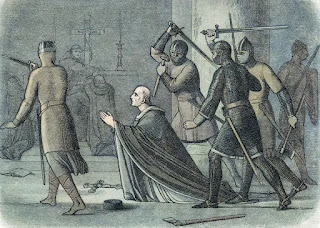Martyrdom, sacrifice, and the power of religious conviction as portrayed in "Murder in the Cathedral"
Introduction
In T.S. Eliot's play "Murder in the Cathedral," the themes of martyrdom, sacrifice, and the power of religious conviction are intricately woven into the fabric of the narrative. Through the character of Thomas Becket and the events surrounding his assassination, the play delves into the profound implications of these themes, inviting readers and audiences to contemplate the complexities of faith, duty, and the ultimate price paid for one's convictions.
Martyrdom as Spiritual Triumph:
Martyrdom is a central theme that runs through the play, representing the willingness to endure suffering and sacrifice for the sake of one's faith. Becket's impending martyrdom is not presented as a defeat, but rather as a triumph—a spiritual victory over the forces of oppression and tyranny. The concept of martyrdom echoes the Christian belief in Christ's crucifixion and resurrection as the ultimate act of sacrifice and redemption. Becket's martyrdom aligns him with Christ-like figures, emphasizing his willingness to lay down his life for a higher cause.
Becket's acceptance of martyrdom reflects his unwavering faith and his understanding that his death serves a greater purpose. His conviction in the righteousness of his cause empowers him to face his impending fate with courage and dignity. The portrayal of martyrdom as a triumph of the spirit over the material world underscores the play's exploration of spiritual transcendence and the enduring impact of selfless sacrifice.
Sacrifice as a Higher Calling:
Sacrifice is intimately linked with the theme of martyrdom, as both concepts involve relinquishing personal desires and comforts for the sake of a greater principle. Becket's decision to return to Canterbury, knowing the dangers that await him, exemplifies his readiness to sacrifice his safety and personal ambitions in service to the Church and his faith. His choice reflects the tension between individual aspirations and the call to fulfil a higher purpose.
 |
| "Murder in the Cathedral" |
The play also highlights the sacrificial nature of leadership. As Archbishop, Becket bears the responsibility of guiding and protecting his flock. His commitment to this role requires him to place the needs of the Church above his own, even if it means facing persecution and death. This theme of selfless sacrifice resonates with broader spiritual and ethical teachings that emphasize the value of prioritizing the collective good over personal gain.
The Power of Religious Conviction:
The power of religious conviction is a driving force in the play, motivating characters to act following their deeply held beliefs. Becket's steadfast commitment to upholding the sanctity of the Church and its principles demonstrates the transformative impact of strong religious convictions. His refusal to compromise his faith, even in the face of temptation and danger, showcases the strength that comes from aligning one's actions with deeply ingrained values.
The conflict between religious conviction and political authority is a central tension in the play. The tensions between Becket and King Henry II highlight the clash between temporal power and spiritual authority. Becket's unyielding stance against the king's encroachments reflects the belief that religious principles should transcend worldly considerations. This theme underscores the enduring struggle between conflicting loyalties and the challenges of navigating the intersections of faith, politics, and personal conscience.
Conclusion
In conclusion, "Murder in the Cathedral" explores the themes of martyrdom, sacrifice, and the power of religious conviction with depth and nuance. Through the character of Thomas Becket and the events of his life, the play invites readers and audiences to reflect on the complexities of faith, the transformative potential of sacrifice, and the enduring strength that emerges from unwavering religious convictions. These themes resonate across time and culture, speaking to the universal human quest for meaning, purpose, and a higher sense of purpose.
.jpeg)

Great work
ReplyDelete